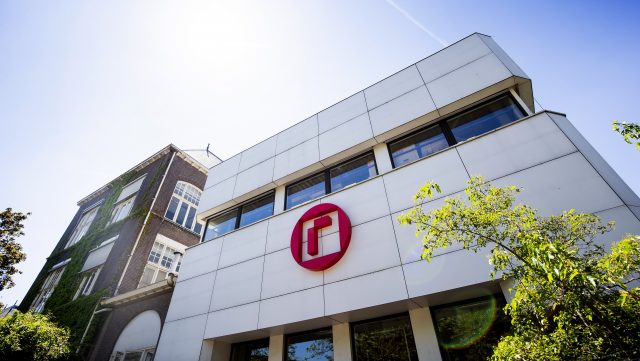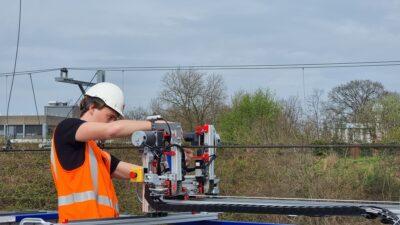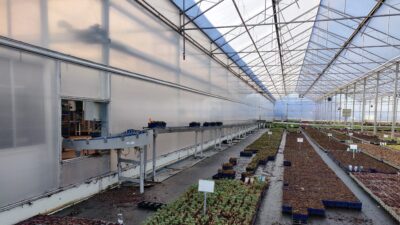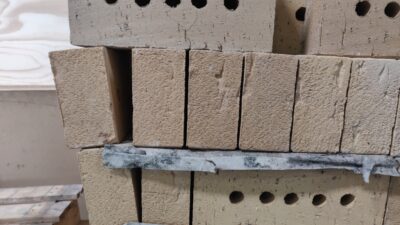As a future of work fieldlab on TU Delft Campus, RoboHouse each year hosts the robotics minor, and since last year also the new MSc Robotics from Delft University of Technology. Our house is home to an increasing number of collaborations between companies and a range of educational institutes. The robotic prototypes and workplace innovations that these students and companies create together are mostly built inside RoboHouse – and now also in the new EDUCATE.
The minor lets students create a robot from scratch. For several intense months, about eight multidisciplinary teams toil for real-life business customers such as Alliander, Deltares and SME’s. “Demo Day is the high point of our entire year,” says Martin Klomp, coordinator of the TU Delft robotics minor and coordinator education programme at RoboHouse. “It also puts some pressure on our infrastructure, as you have teams of students all competing for the same space and resources while they race towards the deadline in January. Sometimes it felt overcrowded. So our eyes fell on an undeveloped area of the building.”
Our eyes fell on an undeveloped area of the building. Martin Klomp, coordinator education programme at RoboHouse

RoboHouse occupies a classic building that was not originally designed to become a fieldlab studded with start-ups, maker spaces and high tech labs. Not all of the building is accessible. Some parts, which are off-limits to both visitors and members, are still in a state dating back to the late twentieth century. One section of the ground floor has now been transformed into EDUCATE, a wing of about 300 square metres.
EDUCATE is built for flexibility. Casper van Eersel, community manager RoboHouse
EDUCATE boasts one meeting room, four offices and one large project space, which can hold about four technical ‘plots’ for minor robotics student teams or short-term leases by robot developers.
Casper van Eersel, community manager, says: “We have learnt never to underestimate the importance of flexibility for people who create robotics. You’re sweating on your designs and technology, until you reach a point where you need tools and lab space, and good coffee, to build and test your robot. But you need all this for just for a limited amount of time. So long-term lease contracts don’t work. EDUCATE is built for flexibility.”

Flexibility is also very much required by MSc Robotics students who work on their Multi-Disciplinary Project. This video – with amongst others Kirsten Heyns, Maxime Croft, Bruno Brito and Astrid van der Niet – shows how MSc Robotics is already becoming a magnet for talent with an appetite for challenge and personal growth. Not just because the technological side is quite unforgiving – unlike AI and other unembodied systems, robots are in constant confrontation with the liveliness and unpredictability of the physical world. But also because robotics engineering is so intensely multi-disciplinary. How do you manage all these dazzlingly different perspectives?
Beautiful robotics projects often start with a simple first step: get into the same space together. David Abbink, professor of haptic human-robot interaction at TU Delft
In the new EDUCATE rooms enveloped by the Botanical Garden, robotics engineering teams will find all the basic things they need to quickly and efficiently work on their most current iteration. Since EDUCATE is located on the ground floor, David Scheper, RoboHouse test center technician, is also nearly always at hand for practical help.

David Abbink, professor of haptic human-robot interaction at TU Delft, thinks that the new facilities will offer even more opportunities for students to meet and work on robot technologies. He hopes that this may lead to even better and more inventive prototypes coming out of the robotics minor and the multidisciplinary project of the MSc Robotics. Abbink says: “Beautiful robotics projects often start with a simple first step: get into the same space together. If you are serious about working with other disciplines, there’s no real substitute for a practical and safe environment that allows you to play, explore and be challenged. EDUCATE is such a place. So I’m really curious how this new part of RoboHouse will influence the type of solutions that students come up with.”
There’s no real substitute for an environment that allows you to play, explore and be challenged. David Abbink, professor of haptic human-robot interaction at TU Delft

The first student teams have already started working in EDUCATE, but you haven’t missed the official launch party; it is about to be scheduled and will be modest, legendary and invitation-only. Watch your inbox and don’t forget to RSVP!



